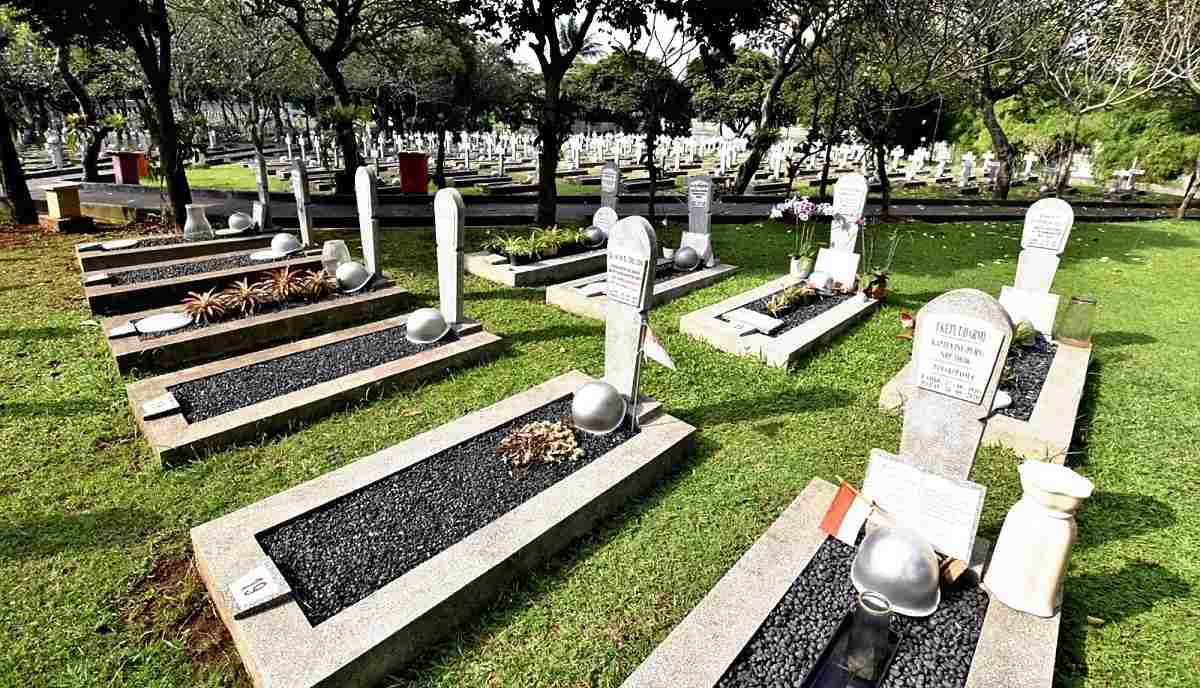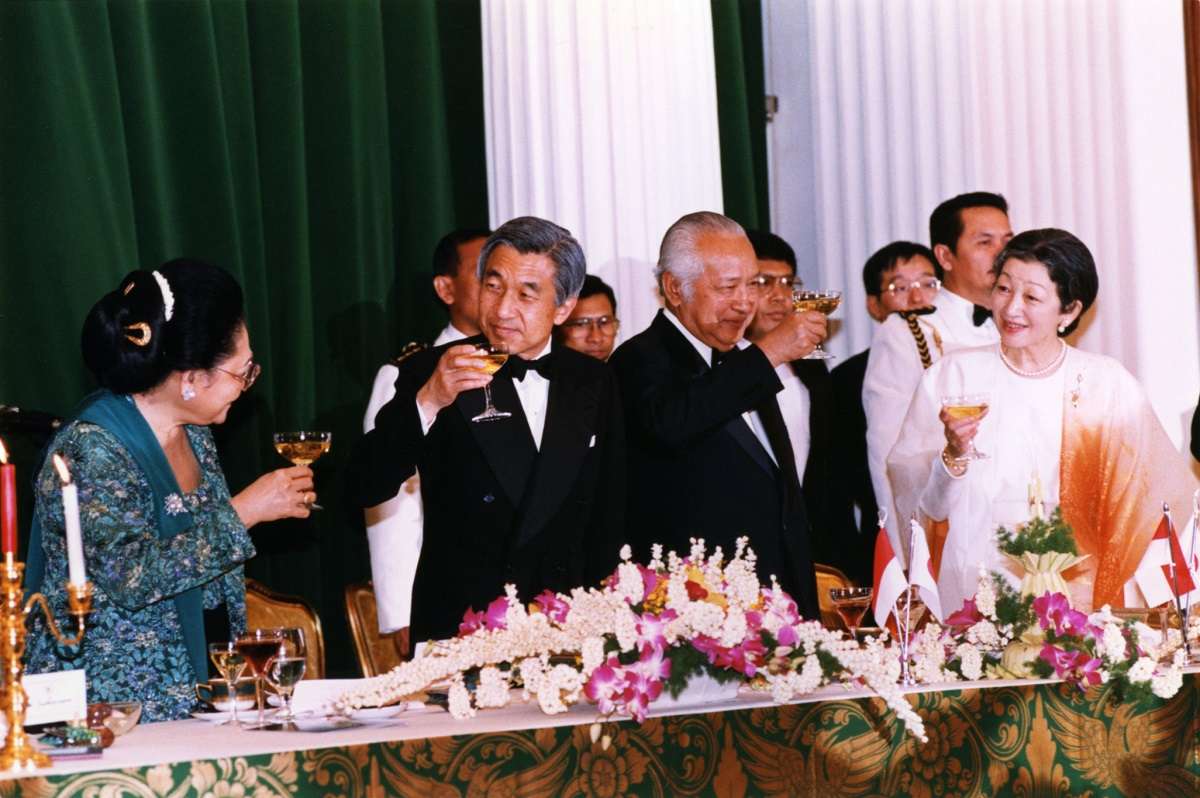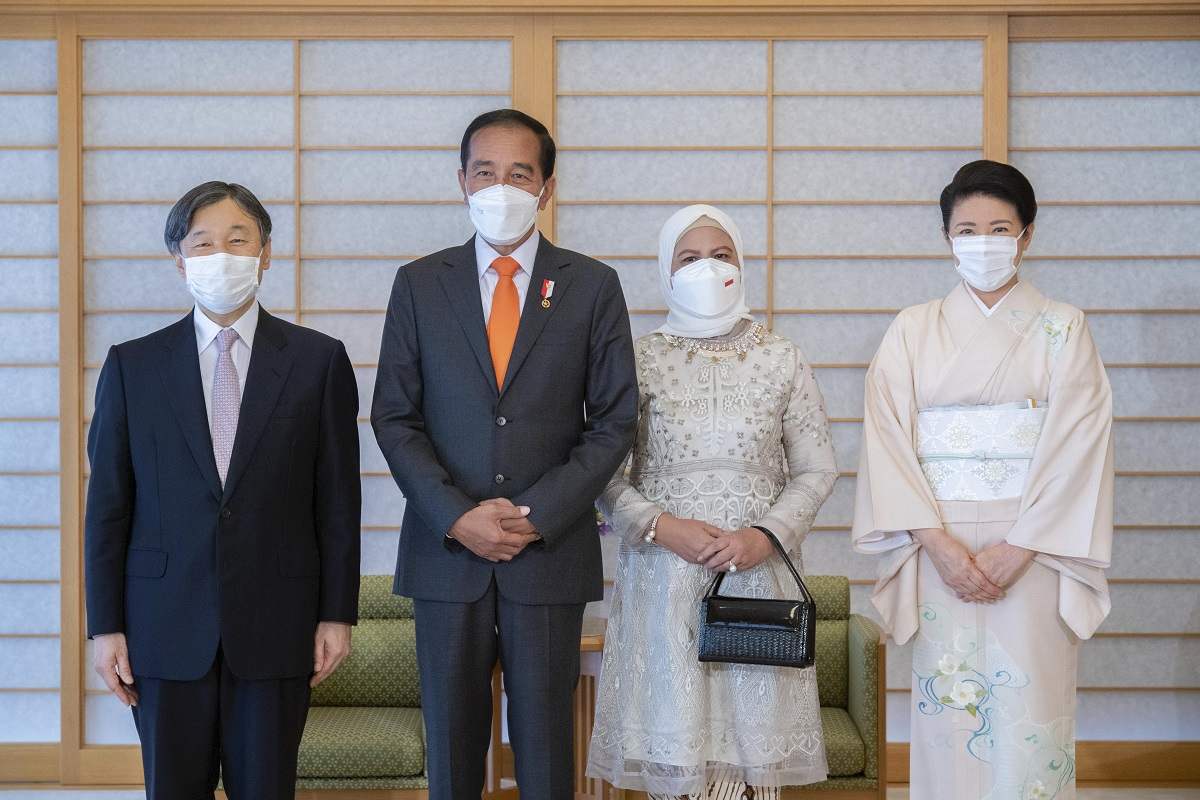Emperor in Reiwa Era – 1st Goodwill Visit / Emperor Plans to Meet Descendants of Former Japanese Soldiers in Indonesia

The Kalibata Hero Cemetery in Jakarta, where some former Japanese soldiers are laid to rest
The Yomiuri Shimbun
6:00 JST, June 15, 2023
The Emperor and Empress will travel to Indonesia from Saturday on their first overseas goodwill visit since the Emperor’s accession to the throne in 2019. How will they conduct international exchanges in the footsteps of the Emperor Emeritus and Empress Emerita? This is the first installment in a series that looks into royal international visits in the current Reiwa era.
***
The Kalibata heroes cemetery in Jakarta is lined with gravestones inscribed with the names of the war dead.
“I want to tell His Majesty the Emperor how my father, who rests here, devoted himself to the friendship and goodwill between Indonesia and Japan,” said a second-generation Japanese-Indonesian man, 63, who lives in Jakarta. He is eagerly anticipating the Emperor and Empress’ visit later this week.
The cemetery is the resting place of some 10,000 people, mainly Indonesian soldiers who fought a four-year war of independence against the colonial Dutch after World War II. Among them are the graves of 28 former Japanese soldiers who remained in the country after the war and joined the Indonesians in their fight for independence. The man’s father, Shichio Eto, was one of them.
When the Emperor Emeritus visited Indonesia in 1991 while he was still Emperor, he laid flowers at the cemetery but was unable to meet with former Japanese soldiers or their descendants.
The former Japanese soldiers were regarded as heroes of the fight for independence, but animosity remained toward the Japanese military, as many people were still alive who remembered the hardships it inflicted during World War II.
Anti-Japanese sentiment was also deep-rooted among the Dutch, whom Japan fought during the war. This made it almost impossible for the then Emperor to meet with former Japanese soldiers and express his appreciation for their services.
It has been almost 78 years since the end of World War II, and new generations have emerged in each country. This time, the Emperor will meet with descendants of former Japanese soldiers in Indonesia.
“An environment has been created for the descendants of the former Japanese soldiers to meet in a natural manner [with the Emperor] as people who are working to promote friendship and goodwill between the two countries,” said a senior official of the Imperial Household Agency. “I think this will be a forward-looking visit while also preserving memories of the war.”
Lingering pain
During World War II, the Japanese military took control of Indonesia, which was then a Dutch territory, for 3½ years until the end of the war. The military mobilized the local population as laborers and confiscated food, causing widespread starvation.
When the Emperor Emeritus visited Indonesia in 1991, his first visit to that country as Emperor, he referred to the devastation of the war at a reception. “Japan has decided to live as a peaceful nation so that the horrors of the last truly unfortunate war will never be repeated, and we have been making efforts to build new friendly relations,” the Emperor Emeritus said.

From left, the wife of Indonesian President Suharto, the Emperor Emeritus, President Suharto and the Empress Emerita attend a reception in Jakarta on Oct. 3, 1991.
During that visit by the Emperor Emeritus and Empress Emerita, the roads were lined with people waving national flags of both countries to welcome the couple.
“People were eagerly hoping to get a glimpse of the Japanese Emperor,” said an 88-year-old man, who accompanied the Imperial couple as the Foreign Ministry’s chief of protocol.
Yet, behind this cordial reception, there were people with mixed feelings about Japan.
On the first day of their visit, people who had served as auxiliary soldiers for Japan held a media conference in Jakarta, demanding that the Japanese government pay the salaries withheld by the army.
The two countries concluded a wartime settlement in 1958, under which the Japanese government agreed to provide reparations worth about ¥80.308 billion at that time to Indonesia. But there were concerns that there would be a new move to seek more compensation.
Aiko Kurasawa, now a professor emeritus of Keio University, was working as a researcher at the Japanese Embassy in Indonesia at that time. According to Kurasawa, there was lingering anti-Japanese sentiment in some parts of the country.
“At that time, many people who had been treated harshly by Japanese forces were still alive,” said Kurasawa, 76. “Anti-Japanese sentiment still prevailed mainly in farming areas where people lived in poverty.”
Soldiers tossed about by history
Even after the end of World War II, some Japanese soldiers remained in Indonesia and fought in the independence war against the Netherlands. There are believed to have been nearly 1,000 such Japanese soldiers, but many died or went missing in the war for independence.
About 300 eventually remained in the Southeast Asian country, but they had to endure misfortune. Back in Japan, they were long regarded as deserters who did not follow the order to return home. In Indonesia, they were unable to get citizenship for a considerable time.
Starting in the 1960s, some of the remaining soldiers managed to achieve higher economic status, working as guides for Japanese firms that expanded into Indonesia or becoming partners in joint ventures. By the mid-1990s, these soldiers regained their honor and came to be treated as “heroes” who helped the country regain independence.
The last remaining Japanese soldier died in 2014. But their descendants settled in local communities, and their number, mainly those in the second to fourth generations, reportedly has increased to about 5,000 today.
Sukirman, 54, is a Jakarta resident whose father was Japanese soldier Tatsuji Maekawa.
“My father never spoke about his wartime memories,” Sukirman said. “But when he was drunk, he sometimes showed us a gunshot wound on his right thigh that he got during the war for independence.”
Sukirman now serves as a bridge between the two countries, operating a company that introduces human resources to local Japanese companies.
“I’m punctual and I keep my word, following the practice of my father, and this helps me gain the trust of my customers,” he said.
He was hopeful over the news that the Emperor and Empress plan to meet the descendants of former soldiers. “I want many people to recognize that these soldiers were the ones who built the foundation of the friendship between our two countries,” Sukirman said.
Facing the scars of war
Evacuated to a rural area during World War II, the Emperor Emeritus faced the scars caused by the war overseas after the conflict ended, visiting Britain, the Netherlands and other countries that Japan fought against.
Former Indonesian President Suharto welcomed the Emperor Emeritus to his country 32 years ago. He was an officer of a volunteer army on the Japanese side during World War II.
The Emperor, 63, was born after the end of the war. In the upcoming visit, he is expected to further promote the ties between the two countries, in cooperation with President Joko Widodo, on the basis of the friendship founded during the Heisei era (1989-2019).

The Emperor, left, and Empress, right, pose for a photo with Indonesian President Joko Widodo and his wife at the Imperial Palace in Tokyo on July 27, 2022.
The Emperor plans to meet the descendants of former Japanese soldiers on the third day of his visit.
The meeting “is expected to deliver the message that Japan has not forgotten the war, even though the times have changed,” said a senior official of the Imperial Household Agency. “We believe it will further enhance the future-oriented relationship between the two countries.”
Most Read
Popular articles in the past 24 hours
-

Voters Using AI to Choose Candidates in Japan's Upcoming General ...
-

Japan's Snow-Clad Beauty: Camellia Flowers Seen in Winter Bloom a...
-

Monkey Strikes Junior High School Girl from Behind in Japan's Yam...
-

Genichiro Inokuma's Mural in Ueno Station That Gave Hope in Postw...
-

Senior Japanese Citizens Return to University to Gain Knowledge, ...
-

Heavy Snow Linked to 30 Deaths across Japan since Late Jan.; JMA ...
-

Tokyo Police Arrest Head of Resignation Assistance Firm
-

Foreign and Security Policy: Political Parties Must Discuss How T...
Popular articles in the past week
-

Japan Institute to Use Domestic Commercial Optical Lattice Clock ...
-

Australian Woman Dies After Mishap on Ski Lift in Nagano Prefectu...
-

Foreign Snowboarder in Serious Condition After Hanging in Midair ...
-

Chinese Embassy in Japan Reiterates Call for Chinese People to Re...
-

Narita Airport, Startup in Japan Demonstrate Machine to Compress ...
-

Toyota Motor Group Firm to Sell Clean Energy Greenhouses for Stra...
-

Sakie Yokota, Last Surviving Parent of a North Korea Abductee, Ur...
-

Beer Yeast Helps Save Labor, Water Use in Growing Rice; Govt Hope...
Popular articles in the past month
-

Univ. in Japan, Tokyo-Based Startup to Develop Satellite for Disa...
-

JAL, ANA Cancel Flights During 3-day Holiday Weekend due to Blizz...
-

China Confirmed to Be Operating Drilling Vessel Near Japan-China ...
-

China Eyes Rare Earth Foothold in Malaysia to Maintain Dominance,...
-

M6.2 Earthquake Hits Japan's Tottori, Shimane Prefectures; No Tsu...
-

Japan Institute to Use Domestic Commercial Optical Lattice Clock ...
-

Japan, Qatar Ministers Agree on Need for Stable Energy Supplies; ...
-

Japan, Italy to Boost LNG Cooperation; Aimed at Diversifying Japa...
Top Articles in Society
-

JAL, ANA Cancel Flights During 3-day Holiday Weekend due to Blizzard
-

Record-Breaking Snow Cripples Public Transport in Hokkaido; 7,000 People Stay Overnight at New Chitose Airport
-

Australian Woman Dies After Mishap on Ski Lift in Nagano Prefecture
-

Foreign Snowboarder in Serious Condition After Hanging in Midair from Chairlift in Nagano Prefecture
-

Train Services in Tokyo Resume Following Power Outage That Suspended Yamanote, Keihin-Tohoku Lines (Update 4)
JN ACCESS RANKING
-

Univ. in Japan, Tokyo-Based Startup to Develop Satellite for Disaster Prevention Measures, Bears
-

JAL, ANA Cancel Flights During 3-day Holiday Weekend due to Blizzard
-

China Confirmed to Be Operating Drilling Vessel Near Japan-China Median Line
-

China Eyes Rare Earth Foothold in Malaysia to Maintain Dominance, Counter Japan, U.S.
-

Japan Institute to Use Domestic Commercial Optical Lattice Clock to Set Japan Standard Time







